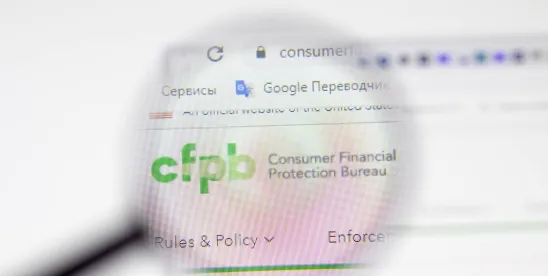On April 16, the Consumer Financial Protection Bureau (CFPB) seemingly provided its employees with a memorandum outlining its ongoing supervisory and enforcement priorities (Memo).1 Although the Memo has not been made publicly available, its contents are consistent with what many in the consumer finance industry assumed would be adopted by the agency's new leadership.
Importantly, the Memo assists entities subject to CFPB supervision and examination by detailing the areas of interest to CFPB leadership and making clear that there is no intention among such leadership to "pursue supervision under novel legal theories," instead relying upon the agency's statutory authority to supervise affected entities. While not fully transparent, it appears likely that this reference to "novel legal theories" is intended to convey to CFPB employees (and the market more broadly) that the agency will not use its statutory authority to designate "larger participants" for supervisory purposes as permitted under the Dodd-Frank Wall Street Reform and Consumer Protection Act. What is wholly unclear, however, is whether industries that have already been designated as "larger participants" by the agency, such as certain consumer reporting agencies, remain subject to ongoing supervision at this time. It also appears unlikely the agency will take on sweeping initiatives to expand its reach, such as how, in recent years, it sought to designate certain consumer leasing products as "credit" despite case law to the contrary.
Five Key Takeaways and Considerations from the CFPB Supervisory and Enforcement Memo
1. Supervisory exams
According to the Memo, such exams will decrease by 50 percent and will focus on "conciliation, correction and remediation of harms subject to consumers' complaints." While the Memo does not go into detail as to whether such "complaint drivers" will come from internal complaint tracking or the CFPB database2 that accepts complaints, we believe the focus will be on complaints posted by consumers to the agency database (and possibly, although less likely, to larger public databases like the Better Business Bureau complaint database).
Consumer financial providers should quickly review all of their associated complaints in the CFPB complaint database to ensure that such complaints have been appropriately addressed, with root causes determined and necessary responses performed.
It is also notable that, where consumer harm is found and penalties are assessed, the Memo makes clear that it will send any funds the CFPB obtains "directly to consumers, rather than imposing penalties on companies in order to simply fill the [agency's] penalty fund."
2. Insured depository institutions
The Memo suggests that the CFPB will "shift [its focus] back to depository institutions." Importantly, the Dodd-Frank Act3 provides that the CFPB has supervisory authority over insured depository institutions with more than $10B in assets in connection with such institutions’ compliance with consumer financial protection laws.
Affected banks would be wise to use this time before the appointment of a permanent director of the CFPB (who will likely staff offices consistent with this and the other priorities in the Memo) to ensure that compliance mechanisms related to the provision of consumer financial products and services are appropriate, compliant and reflective of issues identified in recent consumer complaints.
3. Specific product foci
The Memo provides that residential mortgages are a strong priority, especially where there are "identifiable victims" who have suffered "measurable consumer damages" (emphasis in original). Residential mortgages have always been a significant priority regardless of presidential administration, and most residential mortgage loan originators likely have adequate compliance programs. However, a significant unknown is how the CFPB will treat newer consumer financial products offered in the residential mortgage space, like shared appreciation mortgages and home equity investment products. In addition, the Memo notes that violations of the Fair Credit Reporting Act (as it relates to data furnishing violations) and the Fair Debt Collection Practices Act (as it relates to consumer contracts and debts) will also be priorities.
4. Specific constituent foci
The Memo notes that service members and their families, as well as veterans, are included within its priorities. This requirement reflects an understanding of the Dodd-Frank Act’s specific provisions requiring such work and is consistent with the agency’s actions since its inception.4
5. Federalism/coordinated actions with states
The Memo clarifies that the CFPB will "deprioritize" participation in multistate exams except where statutorily required. Further, the Memo provides that the agency will "deprioritize supervision" where states have "ample regulatory and supervisory authority," unless statutorily required. Importantly, under the Dodd-Frank Act, state attorneys general may "bring a civil action in the name of such State in any district court of the United States in that State or in State court that is located in that State and that has jurisdiction over the defendant, to enforce provisions of this title [the Consumer Financial Protection Act] or regulations issued under this title, and to secure remedies under provisions of this title or remedies otherwise provided under other law."5 Given the statement in the Memo, it is highly likely that certain consumer financial protection laws not specifically identified therein, such as the Truth in Lending Act and the Electronic Funds Transfer Act, will be of minimal interest to agency officials (unless, of course, interest is driven into these areas based upon consumer complaint volume, as described above).
What's Next
Like many aspects of compliance that are in a state of flux with the change in presidential administrations, it is also not clear that a permanent CFPB director will share and support the same supervisory and enforcement goals. Once a permanent director is in place (which is anticipated to occur sometime before mid-June based upon recent reports from Senate Banking Committee leadership6), it is likely that the priorities listed above will require revisiting.
1 Note that the materials relied upon by Katten for purposes of this advisory do not appear publicly on the CFPB’s website. However, the materials reviewed appear on CFPB letterhead and, as described herein, are consistent with public positions agency leadership has taken with respect to the nature of future agency activities in light of the recent presidential election.
2 The CFPB complaint database is available at: https://www.consumerfinance.gov/data-research/consumer-complaints/ (last reviewed April 17, 2025).
3 H.R.4173 - 111th Congress (2009-2010).
4 The Dodd-Frank Act (Section 1013(e)) specifically provides that the "Director shall establish an Office of Service Member Affairs, which shall be responsible for developing and implementing initiatives for service members and their families."
5 12 U.S.C. § 5552(a)(1).
6 See https://www.americanbanker.com/news/senate-eyes-may-for-cfpb-nomination-vote-scott-says which describes Sen. Scott’s prediction regarding the timing of the confirmation of Jonathan McKernan as CFPB Director.








 />i
/>i

